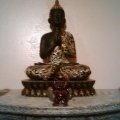Welcome home! Please contact lincoln@icrontic.com if you have any difficulty logging in or using the site. New registrations must be manually approved which may take several days. Can't log in? Try clearing your browser's cookies.
Secular Buddhism???
 JohnCobb
Hot Springs Arkansas Explorer
JohnCobb
Hot Springs Arkansas Explorer
Hello all! Before I seriously started looking into Buddhism, back when I was a staunch atheist, I came across the term secular Buddhism many times, but never gave it much thought. Now that I've been studying Buddhism, I've come across the term a few times and am confused.
What's the point of secular Buddhism? If I understand it right, it's Buddhism without the metaphysical, karma, reincarnation, demi-type-gods, etc. What's the point?
I bow to you all and look forward to your answers once I wake up this afternoon 😊
2


Comments
Well, the Buddha once said ehipassiko, come and see for yourself. What he meant by that is that any teaching that you come across should be examined to see for yourself if you could determine the truth of it, and set aside if you could not. Those with a grounding in science often find this a very comfortable position, which explains its appeal to the western mind.
Often the response to continuing appeals to ehipassiko is a discussion on sraddha, trust and faith in the teachings, which early on in one’s path in Buddhism certainly has a place, and perhaps later as well. Once you have been immersing yourself in it for a little while things start to ‘click’ and you start to see for yourself which things are true for you. The ongoing process of discovery and verification of the teachings is supposed to build an unshakable certainty that the Buddha’s path as described is true and correct.
Secular Buddhism is this discussion taken to an extreme, shedding the supernatural elements of the teachings that cannot be proven and putting them aside. That leaves a focus on the Four Noble Truths, that unhappiness is here, and the Noble Eightfold Path, to Nirvana and enlightenment in this life, as well as disciplines such as mindfulness.
Ultimately there is little difference between secular Buddhism and other types of Buddhism. It is just that a type of Buddhism which places a heavy emphasis on reincarnation may allow people to focus on a path of many lives that ultimately leads to enlightenment, allowing one to slack in this life because it is just a small section of the path. Secular Buddhism places you squarely before the task of trying to achieve enlightenment in this life.
Anyway that’s just my view of it… if it sounds appealing you might want to read some of the books of Stephen Batchelor, who more or less started this ball rolling with his autobiographical Confessions of a Buddhist Atheist.
@Kerome thanks for the thoughtful comment. When taking part in some other online communities, I've been surprised at the scorn I've experienced for the secular approach. It's frequently dressed up as "protecting the dhamma against the spreading of wrong view" or "call it what you want but it's not Buddhism."
It's not important to me what other people call my spiritual practice. I'm not a Buddhist anyway. I'm a person who's trying to reduce suffering, and who's walking that path in the dhamma.
You’re right @ScottPen that the secular way of approaching the dhamma is not always appreciated by other Buddhists. It’s still a very young stream, born in the west so it does not have the support of a lot of the eastern traditions. But it has as its great advantage that it can get very close to a sober historians view of how the Buddha might have lived and walked on this Earth, shorn of all the superstitious trappings of the ancient world. And that surely is valuable.
It’s worth noting that Thich Nhat Hanh’s tradition neatly sidesteps the whole issue by focussing on Mindfulness. Even the Four Noble Truths, held in such esteem by many other traditions, are not given as much attention as Mindful awareness by Thay, although he does sometimes discuss them.
@Kerome thanks again. There are 4 Plum Village sanghas near me, perhaps I'll go sit with them.
Many Buddhists are atheists. Some will tolerate some practices involving deities. Vajrayana conjures up and dismisses deities. What fun!
Personally I like to do the impossible (do not try this at home). I believe a part of me is God AND do not believe I have a self … Tee hee!
Secular Buddhism is pragmatic. Just because I am engaged, does not mean marriage …
https://en.m.wikipedia.org/wiki/Engaged_Buddhism
… and now back to the full secular …
He does kind of sidestep it doesn't he? Another way he does that is by advocating we not cling to views.
Here is a good example of how he uses mindfulness to show the line between the mundane and the divine is purely perspective.
Yes, and the whole focus on mindfulness helps Thich Nhat Hanh’s tradition stay modern and fresh and accessible. It feels a lot less driven by “the lists”, the particular syndrome you find in for example Tibetan Gelugpa Buddhism, where they teach everything in “four of this” and “six of that”, which is a symptom of memorisation driven learning.
Well like all other schools sects & traditions of Buddhism ...it's aim is to end suffering... Dharma practice is Dharma practice..... it does not discriminate ...however Secular Buddhism is practice without all the trappings that is, without obstructions AKA without the bells & whistles...
Thus have I heard some Secular Buddhists just see the so called gods in Buddhism as mind tools, to remind and bring to the fore the wholesome god qualities the practitioner already possesses, but more often than not these god qualities are clouded by mind junk...
One could say Secular Buddhism is (in a nutshell) Dharma for the harden Atheist ...
Yes, one could say that. I certainly can relate.
I think atheists get a bit of a bad rap, especially when they are considered “hardened”, as if they are rational robots who exclude all fantasy. Personally I like the rules of evidence and reason, and I think a lot of supernatural elements in religion are not much different from superstition. But I have lived through times which have convinced me that there is more to our world than just the visible. It is merely ehipassiko carried to its logical conclusion.
When I use the term "harden Atheist" I refer to those who see Buddhism as inner science that is "the pursuit and application of knowledge and understanding of the Mind which includes the natural and social world following a systematic methodology based on evidence" "Ehipassiko" ...
For some practitioners (Secular in nature) thoughts of deities and reincarnation serve no beneficial purpose, however this is not to say that those who do use deities and thoughts of reincarnation in their practice are wrong, far from it many from what I gather benefit greatly from such practice...
It's a case of Different strokes of the paddle for different folks on the raft
And.....
"The most essential method, which includes all other methods, is to behold the Mind..The Mind is the root from which all things grow...If you can understand the Mind...Everything else is included..."
~Bodhidharma~
I think a lot of agnostics are also drawn to secular Buddhism. Those people who prefer not to immediately say “these things are not possible” but also don’t feel as if they can just accept them without thorough proof, but instead say “I do not know”.
Stephen Batchelor too has a very gentle turn of phrase, he tries very hard not to offend anyone while still saying what he wants to say.
The point is the crux of the Buddha's teachings: the 4 Noble Truths: 1. Life is stressful.and full of suffering. 2. The root cause of the suffering is in our minds: attachment/grasping (desire, greed), ignorance and delusion, and hatred. 3. There is a way out of the stress and suffering. 4. The Dharma is the (Eightfold) Path to the cessation of suffering.
Interestingly enough, the Buddha in his early discourses advised not to concern oneself with future lives, but to focus on the current lifetime, and eliminating one's suffering within this current life. Secular Buddhism tends to give a lot of weight to those early discourses.
Secular matters are the entirety of Buddhism. To have a profound understanding of Buddhism is to have a profound understanding of secular matters.
In the mundane magical realm …
https://findingnature.org.uk/2020/11/03/why-the-mundane-is-magical/
… we balance out our middle way
In this sense, ideas that ring our bell, help us resonate and expand our personal mandala
To put it another way:
"Behold, O monks, this is my advice to you. All component things in the world are changeable. They are not lasting. Work hard to gain your own salvation."
This makes me wonder. How did the monks get by after the Buddha was gone? The Buddha spent part of his time doing what we would call "fund-raising" for his monks' movement, garnering major donations from wealthy patrons. How did the monks live, after their fund-raiser was gone? I suppose they could always survive on food donations, but what about housing? They'd need a roof over their heads during monsoon season.
Off-topic, perhaps, but I'm wondering how "gaining [one's] own salvation" would help provide food and shelter.
Dropping by from the fantasy world.
I'd highly recommend Gil Fronsdale's recent book The Buddha Before Buddhism. It's not explicitly secular but he looks at the very earliest teachings of the Buddha and it is noticable how devoid of the mystical it is.
I’m curious to know what you mean by “mystical”?
Those were the early teachings I was referring to earlier in the thread. That's a great book, I've recommended it before, here. I think we even had a "book club" group reading it together and discussion, at one point. It's fascinating to see what the Buddha was thinking and teaching at that early stage.
Sure, to clarify, I guess I'm talking about magical or supernatural stuff. Particularly miracles and cosmology, its been a while since I read the book but I don't think there is a whole lot there regarding karma or rebirth either.
I remember the earliest teachings portrayed in the book as being pretty practical and ordinary.
What a great interview. I will check the book out tonight.
Happy Sunday
A lot of westerners struggle with the metaphysical and "religious" aspects of Buddhism, so in that sense Secular Buddhism is a logical development. Though it's also the case that Secular Buddhism has assumptions of it's own.
There are also a lot of almost Buddhist streams developing, that build on Buddhist teaching but don’t bill themselves as Buddhist. For example, Sam Harris’ Waking Up is in this direction, as is Adyashanti’s teaching, as indeed is the whole Mindfulness movement.
Yes, I was involved in MBSR for a while, which is closely based on satipatthana.
(Mindfulness Based Stress Reduction).
And there's that RAIN, thing, I can't recall who came up with that?